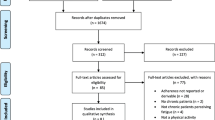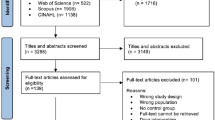Abstract
Background
This study aimed at assessing the effects of a self-regulation-based brief physical activity program for patients suffering from unexplained chronic fatigue, the “4-STEPS to control your fatigue program”.
Method
A 12-week randomized controlled trial was conducted. Adult patients meeting the CDC criteria for idiopathic chronic fatigue were randomized to either the control condition (standard care) or the intervention condition (4-STEPS). The 4-STEPS was based on self-regulation principles and consisted of motivational interviewing and self-regulation skills training. All patients were assessed at baseline and post-treatment (12 weeks) for fatigue severity (primary outcome) and impact, physical activity (leisure time physical activity, number of daily steps and personal activity goal progress), health-related quality of life, somatic distress and psychological distress (depression and anxiety).
Results
Ninety-one patients (45 intervention and 46 control patients) received the allocated intervention. At post-treatment, statistical analysis revealed a significant difference for subjective experience of fatigue (4.73 points; g = 0.51) in favour of the intervention group. Mixed design ANCOVAs showed a significant effect of the 4-STEPS on fatigue severity, leisure time physical activity, personal activity goal progress and health-related quality of life. No significant effects were found for number of daily steps and somatic and psychological distress.
Conclusion
The 4-STEPS program has significant beneficial effects at post-treatment. This brief self-regulation-based intervention looks promising for the management of unexplained chronic fatigue.
Trial Registration: ISRCTN70763996

Similar content being viewed by others
References
Fukuda K, Strauss S, Hickie I, Sharpe M, Dobbins J, Komaroff A. The chronic fatigue syndrome: a comprehensive approach to its definition and study. Ann Intern Med. 1994;121:953–9.
Afari N, Buchwald D. Chronic fatigue syndrome: a review. Am J Psychiatry. 2003;160:221–36. doi:10.1176/appi.ajp.160.2.221.
Prins JB, Vand der Meer JWM, Bleijenberg G. Chronic fatigue syndrome. Lancet. 2006;367:346–55.
Clark L, White P. The role of deconditioning and therapeutic exercise in chronic fatigue syndrome (CFS). J Ment Health. 2005;14(3):237–52. doi:10.1080/09638230500136308.
Fulcher K, White P. Strength and physiological response to exercise in patients with chronic fatigue syndrome. J Neurol Neurosurg Psychiatry. 2000;69:302–7. doi:10.1136/jnnp.69.3.302.
Nijs J, Wallman K, Paul L. Chronic fatigue syndrome. In: Saxton JM, editor. Exercise and chronic disease: an evidence-based approach. New York: Routledge; 2011. p. 322–38.
National Institute for Health and Clinical Excellence (NICE). Clinical guideline 53. Chronic fatigue syndrome/myalgic encephalomyelitis or encephalopathy: diagnosis and management of CFS/ME in adults and children. London; 2007.
Edmonds L, McGuire L, Price J. Exercise therapy for chronic fatigue syndrome. Cochrane Database Syst Rev. 2004;3, CD003200.
Price J, Mitchell E, Tidy E, Hunot V. Cognitive behaviour therapy for chronic fatigue syndrome in adults. Cochrane Database Syst Rev. 2008;3, CD001027.
Castell BD, Kazantsis N, Moss-Morris R. Cognitive behavioral therapy and graded exercise for chronic fatigue syndrome: a meta-analysis. Clin Psychol Sci Pract. 2011;18(4):311–24. doi:10.1111/j.1468-2850.2011.01262.x.
Malouff JM, Thorsteinsson EB, Rooke SE, Bhullar N, Schutte NS. Efficacy of cognitive behavioral therapy for chronic fatigue syndrome: a meta-analysis. Clin Psychol Rev. 2008;28(5):736–45. doi:10.1016/j.cpr.2007.10.004.
Knoop H, Van der Meer J, Bleijenberg G. Guided self-instructions for people with chronic fatigue syndrome: a randomised controlled trial. Br J Psychiatry. 2008;190:340–1. doi:10.1192/bjp.bp.108.051292.
Tummers M, Knoop H, van Dam A, Bleijenberg G. Implementing a minimal intervention for chronic fatigue syndrome in a mental health centre: a randomized controlled trial. Psychol Med. 2012;42(10):2205–15. doi:10.1017/S0033291712000232.
Powell P, Bentall R, Nye F, Edwards R. Randomised controlled trial of patient education to encourage graded exercise in chronic fatigue syndrome. BMJ. 2001;322:387. doi:10.1136/bmj.322.7283.387.
Carver CS, Scheier MF. On the self-regulation of behavior. New York: University Press; 1998.
Maes S, Karoly P. Self-regulation assessment and intervention in physical health and illness: a review. Appl Psychol: Int Rev. 2005;54(29):267–99. doi:10.1111/j.1464-0597.2005.00210.x.
Michie S, Abraham C, Whittington C, McAteer J, Gupta S. Effective techniques in healthy eating and physical activity interventions: a meta-regression. Health Psychol. 2009;28(6):690–701. doi:10.1037/a0016136.
Sniehotta FF, Scholz U, Schwarzer R. Bridging the intention–behaviour gap: planning, self-efficacy, and action control in the adoption and maintenance of physical exercise. Psychol Health. 2005;20(2):143–60. doi:10.1080/08870440512331317670.
Janssen V, Gucht V, Exel H, Maes S. A self-regulation lifestyle program for post-cardiac rehabilitation patients has long-term effects on exercise adherence. J Behav Med. 2013:1–14. doi:10.1007/s10865-012-9489-y.
Knittle K, Gucht V, Hurkmans E, et al. Targeting motivation and self-regulation to increase physical activity among patients with rheumatoid arthritis: a randomised controlled trial. Clinic Rheumat. 2013:1–8. doi:10.1007/s10067-013-2425-x.
Miller W, Rolnick S. Motivational interviewing: helping people change. 3rd ed. NY: The Guiford Press; 2012.
Lundhal BW, Kunz C, Brownell C, Tollefson D, Burke BL. A meta-analysis of motivational interviewing: tewnty-five years of empirical studies. Res Social Work Pract. 2010;20(2):137–60. doi:10.1177/1049731509347850.
Marques M, De Gucht V, Maes S, Leal I. Protocol for the “Four steps to control your fatigue (4-STEPS)” randomised controlled trial: a self-regulation based physical activity intervention for patients with unexplained chronic fatigue. BMC Public Health. 2012;12(202). doi:10.1186/1471-2458-12-202
American College of Sports Medicine. ACSM’s guidelines for exercise testing and prescription. 8th ed. Baltimore: Lippincott Williams & Williams; 2009.
Wagner D, Nisenbaum R, Heim C, Jones JF, Unger ER, Reeves WC. Psychometric properties of the CDC symptom inventory for assessment of chronic fatigue syndrome. Popul Health Metrics. 2005;3:8. doi:10.1186/1478-7954-3-8.
De Marques M, Gucht V, Gouveia MJ, Cordeiro A, Maes S. Psychometric properties of the Portuguese version of the Checklist of Individual Strength (CIS20-P). Psychol Commun Health. 2013;22(1):11–8. doi:10.5964/pch.v2i1.57.
Vercoulen J, Alberets M, Bleijenberg G. De Checklist Individual Strength (CIS). Gedragstherapie. 1999;32:31–6.
De Vree B, van der Werf S, Prins J, Bazlmans E, Vercoulen J, Servaes P. Meetinstrumenten bij chronische vermoeidheid. Gedragstherapie. 2002;35:157–64.
Cleeland C, Ryan K. Pain assessment: global use of the brief pain inventory. Ann Acad Med Singap. 1994;23:129–38.
Wendel-Vos G, Schuit A, Saris W, Kromhout D. Reproducibility and relative validity of the short questionnaire to assess health-enhancing physical activity. J Clin Epidemiol. 2003;56:1163–9. doi:10.1016/S0895-4356(03)00220-8.
Ainsworth B, Haskell W, Whitt M, et al. Compendium of physical activities: an update of activity codes and MET intensities. Med Sci Sports Exerc. 2000;32 Suppl 9:498–504.
Ainsworth B, Haskell W, Herrmann S, et al. Compendium of Physical Activities: a second update of codes and MET values. Med Sci Sports Exerc. 2011;43(8):1575–81. doi:10.1249/MSS.0b013e31821ece12.
Welk GJ, Differding JA, Thompson RW, Blair SN, Dziura J, Hart P. The utility of the Digi-walker step counter to assess daily physical activity patterns. Med Sci Sports Exerc. 2000;32(9 Suppl):S481–8.
Le Masurier GC, Tudor-Locke C. Comparison of pedometer and accelerometer accuracy under controlled conditions. Med Sci Sports Exerc. 2003;35(5):867–71. doi:10.1249/01.MSS.0000064996.63632.10.
Maes S, Karoly P, De Gucht V, Ruehlman LS, Heiser W: The self-regulation skills battery (SRSB). Leiden(NL)/Phoenix (AZ): Leiden University & Arizona State University; 2006.
Ware JE, Kosinski M, Turner-Bowker DM, Gandek B. How to score version 2 of the SF-12® Health Survey. Lincoln: Quality Metric Incorporated; 2002.
Kroenke K, Spitzer R, Williams J. The PHQ-15: validity of a new measure for evaluating the severity of somatic symptoms. Psychosom Med. 2002;64:258–66.
Degoratis L. Brief Symptom Inventory: administration, scoring and procedures manual. 4th ed. Minneapolis: National Computer System; 1993.
Faul F, Erdfelder E, Lang A, Buchner A. G*Power 3: a flexible statistical power analysis program for the social, behavioural and biomedical sciences. Behav Res Methods. 2007;39:175–91. doi:10.3758/BF03193146.
Stulemeijer M, de Jong L, Fiselier T, Hoogveld S, Bleijenberg G. Cognitive behaviour therapy for adolescents with chronic fatigue syndrome: randomised controlled trial. BMJ. 2005;330(7495):820. doi:10.1136/bmj.38301.587106.63.
Hedges LV. Distribution Theory for glass’s estimator of effect size and related estimators. J Educ Behav Stat. 1981;6(2):107–28.
White PD, Goldsmith KA, Johnson AL, et al. Comparison of adaptive pacing therapy, cognitive behaviour therapy, graded exercise therapy, and specialist medical care for chronic fatigue syndrome (PACE): a randomised trial. Lancet. 2011;377(9768):823–36. doi:10.1016/S0140-6736(11)60096-2.
Vos-Vromans DC, Smeets RJ, Rijnders LJ, et al. Cognitive behavioural therapy versus multidisciplinary rehabilitation treatment for patients with chronic fatigue syndrome: study protocol for a randomised controlled trial (FatiGo). Trials. 2012;13(1):71. doi:10.1186/1745-6215-13-71.
Tudor-Locke C, Craig CL, Aoyagi Y, et al. How many steps/day are enough? For older adults and special populations. Int J Behav Nutr Phys Act. 2011;8(1):80. doi:10.1186/1479-5868-8-80.
Wallman K, Morton A, Goodman C, Grove R, Guilfoyle A. Randomised controlled trial of graded exercise in chronic fatigue syndrome. Med J Aust. 2004;180(9):444–8.
Moss-Morris R, Sharon C, Tobin R, Baldi J. A randomized controlled graded exercise trail for chronic fatigue syndrome: outcomes and mechanisms of change. J Health Psychol. 2005;10(2):245–59. doi:10.1177/1359105305049774.
Nijs J, Paul L, Wallman K. Chronic fatigue syndrome: an approach combining self-management with graded exercise to avoid exacerbations. J Rehabil Med. 2008;40:241–7. doi:10.2340/16501977-0185.
De Gucht V, Maes S. Explaining medically unexplained symptoms: toward a multidimensional theory-based approach to somatisation. J Psychosom Res. 2006;60:349–52. doi:10.1016/j.jpsychores.2006.01.021.
Schulz K, Altman D, Moher D, and the CONSORT Group. CONSORT 2010 Statement: updated guidelines for reporting parallel group randomised trials. BMC Med. 2010;8(1):18. doi:10.1136/bmj.c332.
Acknowledgments
This study was partially funded by the Portuguese Foundation for Science and Technology with a grant to the first author (SFRH/BD/47579/2008). The authors would like to thank all patients that participated in this research, the directors and medical doctors from the health-care centres (USF Conde de Oeiras, USF São Julião, USF Marginal, USF Navegantes, Medicil), the volunteers from MYOS, Andreia Cordeiro and Maria João Gouveia. We thank Keegan Knittle for his help with the revision of the manuscript.
Informed Consent
All procedures followed were in accordance with the ethical standards of the responsible committee on human experimentation (Portuguese Medical-Ethics Committee of the Regional Health Administration guidelines) and with the Helsinki Declaration of 1975, as revised in 2000. Informed consent was obtained from all patients before being included in the study.
Conflict of Interest
Marta Marques, Véronique de Gucht, Isabel Leal and Stan Maes declare that they have no conflict of interest.
Author information
Authors and Affiliations
Corresponding author
Rights and permissions
About this article
Cite this article
Marques, M., De Gucht, V., Leal, I. et al. Effects of a Self-regulation Based Physical Activity Program (The “4-STEPS”) for Unexplained Chronic Fatigue: a Randomized Controlled Trial. Int.J. Behav. Med. 22, 187–196 (2015). https://doi.org/10.1007/s12529-014-9432-4
Published:
Issue Date:
DOI: https://doi.org/10.1007/s12529-014-9432-4




